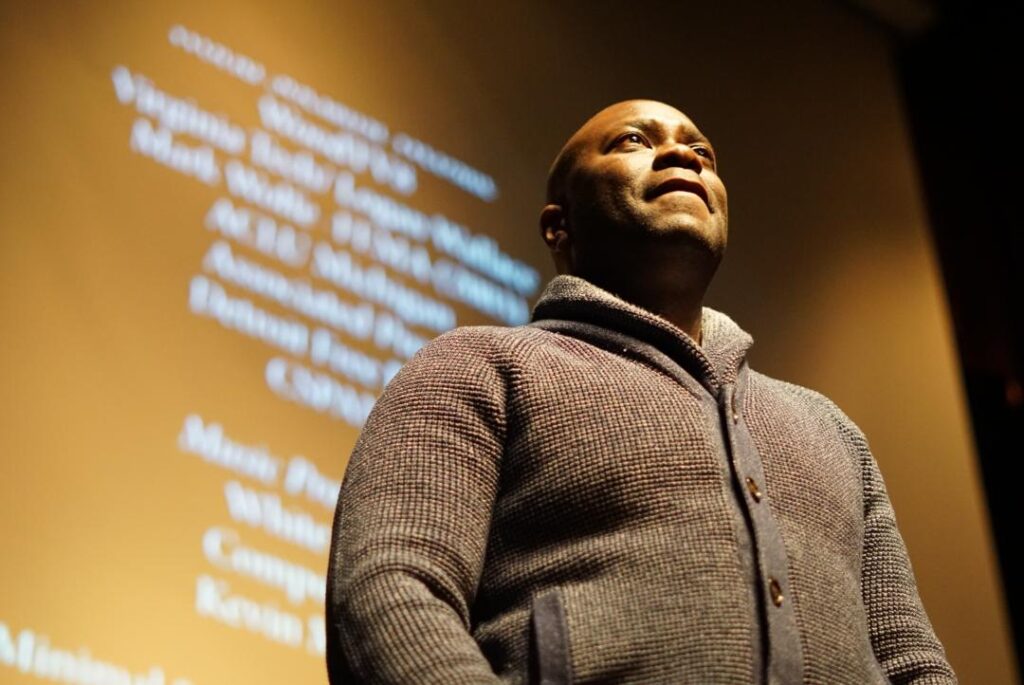Special from Monroe News
“Nor Any Drop to Drink” a documentary by Cedric Taylor, tells of the community of Flint coming together to share their story and personal accounts of the Flint water crisis.
Starting back in 2014, the Flint water crisis continues to make an impact on Flint and surrounding communities.
Taylor, director of “Nor Any Drop to Drink” knew action needed to be taken.
“I felt that the different news releases in terms of different news stations dealt with the issue, they pointed to certain facts along the way, but they didn’t go into a lot of depth I thought” Taylor said. “The documentary film has a way of connecting the dots, connecting issues, to explain the water crisis.”
Before the feature, community members, MCCC faculty and students had the opportunity to drink from four different types of water. The types included artisan water, distilled water, tap water, and Fiji Water.
Monroe residents Ron George and Nillian Trikes sipped the different water types commenting on which one they thought they were.
Along with the water-tasting tables, was MCCC’s Respiratory Therapy Student Club and The Writing Fellow’s book sale.
Following everyone was asked to head into the La-Z-Boy Center to view “Nor Any Drop to Drink”.
The documentary begins with Lendra Brown preparing for her day using bottled water to bathe herself as she cannot use the water from the tap.

“Some of the stories overlapped a lot, so I wanted to tease out some of the stories and I zeroed in on Nakiyah as well as Lendra, as main folks,” Taylor said.
Nakiyah Wakes, a Flint citizen, has had similar issues with her water having high levels of lead in her children’s system.
Her son has been affected by the lead, causing him to have bursts of anger and get 56 suspensions from school.
“It not only informs and gives some context behind what happened, it really forces people to get emotionally invested in the issue, it builds a bridge between folks who might on the onset may not see that they have something in common,” Taylor said.
Along with Flint resident’s testimonials were facts from city officials, environmentalists, and everyone that was involved in a major way of putting the pieces together.
“If you are in education, if you are a teacher, there is definitely that aspect of it,” Taylor said.
During the documentary, Flint Public Schools deemed the water unsafe for their students, switching to bottled water.
Symptoms from Flints tap water included: skin rashes, hair loss, and stunted growth in children, one Flint mother had to say.
Taylor commented that he has had a wide range of reactions from people who have viewed his documentary.
“People have come out and have been very supportive, very touched by the film. They have become enraged; they have become really motivated to do something,” Taylor said.
Following the film Taylor stayed to answer questions from the audience.
The questions ranged from asking about its current status, in which he states, currently Flint is saying that water levels are safer now, to the impact the documentary has made.
“So, there are people from all over the country, different parts of the world who they feel a connection to the people in Flint. Because when it comes down to it, we are all human beings, and seeing suffering, for many people, it does something to many people. I think that’s the power of documentary,” Taylor said.
Taylor did mention he wanted Mona Hanna-Attisha, author of “What the Eyes Don’t See”, to be in the documentary, but she had prior engagements.
“It’s informative, it’s touching, and I think that it should inspire people to do something,” Taylor said regarding Hanna-Attisha’s book.
Taylor said an estimated $20,000 went into making the documentary, from traveling around Michigan to get the interviews to putting the film together.
Carrie Nartker, MCCC professor closed up the questions by stating the turnout was not what they intended. The ongoing Corona Virus has kept people inside, having the attendance be a little over a dozen people.
The feedback from the audience in La-Z-Boy was very positive and supportive but shocked over the personal testimonials.
This event was part of One Book One Community.
The following events have been cancelled due to the COVID-19 pandemic.
“Nor Any Drop to Drink” may be found on Vimeo, or you can check out a screening at multiple Michigan locations which may be found on the website: noranydropfilm.com

